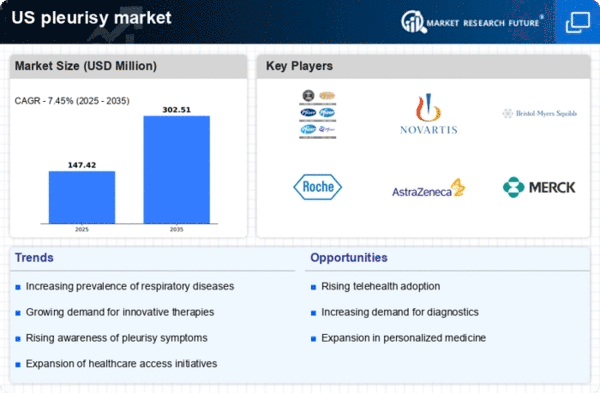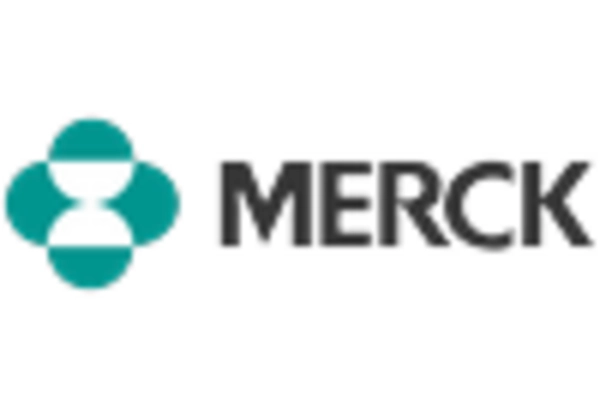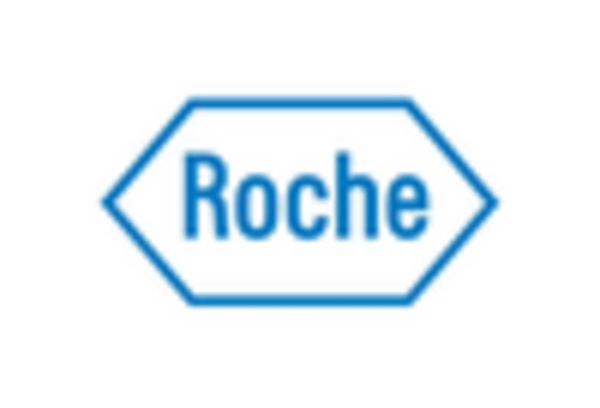Growing Geriatric Population
The aging population in the US is a significant factor influencing the pleurisy market. As individuals age, they become more susceptible to respiratory diseases and related complications, including pleurisy. The US Census Bureau projects that by 2030, approximately 20% of the population will be aged 65 and older. This demographic shift is likely to result in a higher incidence of pleurisy, as older adults often experience weakened immune systems and chronic health conditions. Consequently, healthcare systems may need to allocate more resources to manage pleurisy cases, thereby driving demand for treatments and services within the pleurisy market. The implications of this trend could lead to increased healthcare expenditures and a focus on preventive care.
Rising Healthcare Expenditure
The upward trend in healthcare spending in the US is a crucial driver for the pleurisy market. With healthcare expenditures projected to reach $6 trillion by 2027, there is a growing emphasis on investing in effective treatments for respiratory conditions. This increase in funding allows for better research, development, and accessibility of pleurisy treatments. Furthermore, as insurance coverage expands and more patients seek care, the demand for pleurisy-related services is expected to rise. The financial commitment to healthcare may lead to innovations in treatment options and improved patient education, ultimately fostering growth in the pleurisy market.
Enhanced Healthcare Infrastructure
Improvements in healthcare infrastructure across the US are positively impacting the pleurisy market. The expansion of hospitals, clinics, and telehealth services has made it easier for patients to access care for respiratory conditions. According to the American Hospital Association, there has been a 5% increase in the number of hospitals equipped to handle respiratory illnesses in recent years. This enhanced infrastructure facilitates timely diagnosis and treatment of pleurisy, potentially reducing complications and hospital stays. As healthcare facilities continue to evolve and adapt to patient needs, the pleurisy market is likely to benefit from increased patient engagement and improved health outcomes.
Advancements in Treatment Modalities
Innovations in treatment options for pleurisy are driving the pleurisy market forward. The development of new anti-inflammatory medications and targeted therapies has improved patient outcomes and reduced recovery times. Recent studies indicate that the introduction of biologics and corticosteroids has led to a 30% improvement in symptom management for pleurisy patients. Furthermore, the rise of minimally invasive procedures for fluid drainage has enhanced the therapeutic landscape. As these advancements continue to emerge, they are expected to attract investment and research, thereby stimulating growth in the pleurisy market. The ongoing evolution of treatment modalities may also lead to increased awareness and diagnosis of pleurisy.
Rising Incidence of Respiratory Diseases
The increasing prevalence of respiratory diseases in the US is a notable driver for the pleurisy market. Conditions such as pneumonia, tuberculosis, and chronic obstructive pulmonary disease (COPD) contribute to a heightened incidence of pleurisy. According to the Centers for Disease Control and Prevention (CDC), respiratory diseases account for a significant portion of hospital admissions, with pneumonia alone leading to over 1 million hospitalizations annually. This trend suggests a growing patient population that may develop pleurisy as a complication, thereby expanding the market. The pleurisy market is likely to experience growth as healthcare providers seek effective treatments and management strategies for these interconnected conditions.
.png)
















